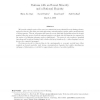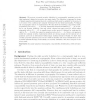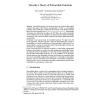TCC
2009
Springer
14 years 4 months ago
2009
Springer
We present the first hierarchical identity based encryption (HIBE) system that has full security for more than a constant number of levels. In all prior HIBE systems in the literat...
TCC
2009
Springer
14 years 4 months ago
2009
Springer
It is well known that general secure function evaluation (SFE) with information-theoretical (IT) security is infeasible in presence of a corrupted majority in the standard model. ...
TCC
2009
Springer
14 years 4 months ago
2009
Springer
We study the possibility of constructing encryption schemes secure under messages that are chosen depending on the key k of the encryption scheme itself. We give the following sep...
TCC
2009
Springer
14 years 4 months ago
2009
Springer
We provide a simple protocol for secret reconstruction in any threshold secret sharing scheme, and prove that it is fair when executed with many rational parties together with a s...
TCC
2009
Springer
14 years 4 months ago
2009
Springer
Existing definitions of program obfuscation do not rule out malleability attacks, where an adversary that sees an obfuscated program is able to generate another (potentially obfus...
TCC
2009
Springer
14 years 4 months ago
2009
Springer
This paper considers two questions in cryptography. Cryptography Secure Against Memory Attacks. A particularly devastating side-channel attack against cryptosystems, termed the &qu...
TCC
2009
Springer
14 years 4 months ago
2009
Springer
We address one of the foundational problems in cryptography: the bias of coin-flipping protocols. Coin-flipping protocols allow mutually distrustful parties to generate a common u...
TCC
2009
Springer
14 years 4 months ago
2009
Springer
We propose a general security definition for cryptographic quantum protocols that implement classical non-reactive two-party tasks. The definition is expressed in terms of simple q...
TCC
2009
Springer
14 years 4 months ago
2009
Springer
Extractable functions are functions where any adversary that outputs a point in the range of the function is guaranteed to "know" a corresponding preimage. Here, knowledg...
TCC
2009
Springer
14 years 4 months ago
2009
Springer
Various results show that oblivious transfer can be implemented using the assumption of noisy channels. Unfortunately, this assumption is not as weak as one might think, because i...





